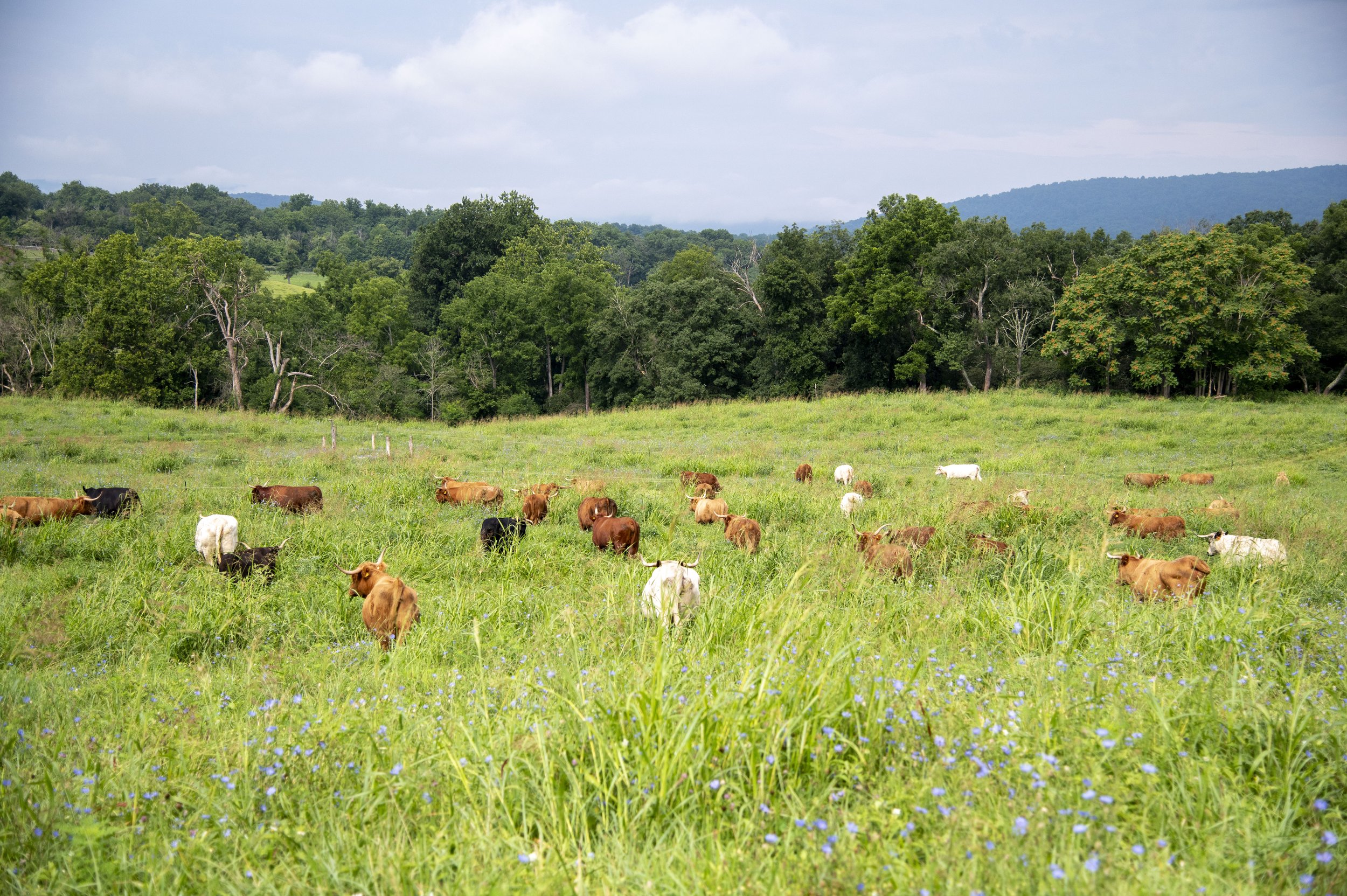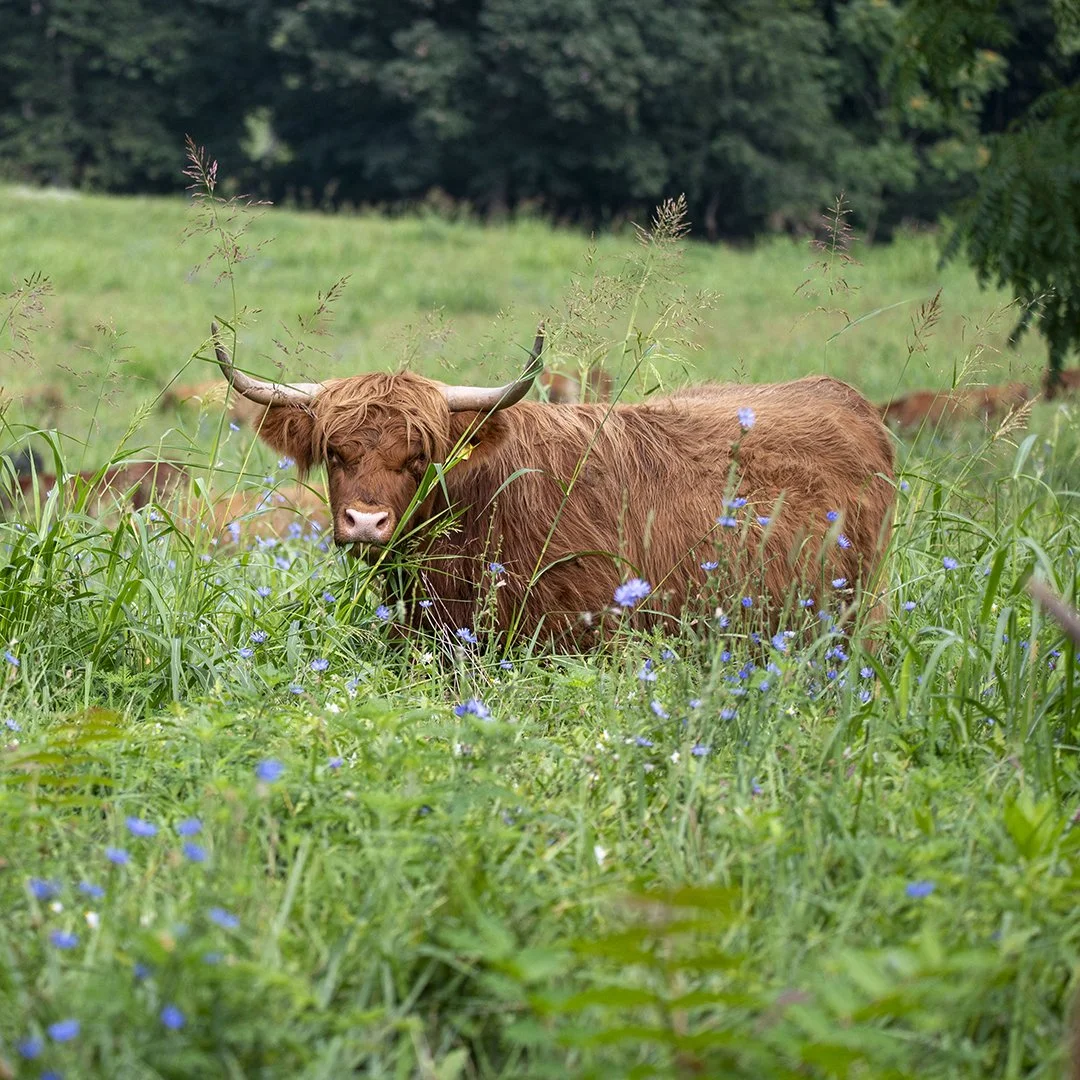Rooted in Tradition, Driven by Sustainability.
Ayrshire Farm was founded in 1996 on a mission to raise animals with respect, care, and dignity. We believe in farming as it was meant to be — working in harmony with nature, improving the land through regenerative practices, and producing meat that’s as humane as it is delicious.
Ayrshire Farm is unique in the region as a working farm that has met the 21st century with one foot firmly planted in the 19th. The first farm in Virginia to be Certified Humane®, Certified USDA Organic, and Certified Predator Friendly, Ayrshire raises rare and endangered breeds of cattle, pigs and poultry, including Highland, Ancient White Park and English Longhorn cattle as well as Gloucestershire Old Spot pigs and Broad-Breasted Bronze turkeys.
By creating a home and a market for these hardy landrace animals, we are ensuring their continued survival.
Good Food From the Ground Up.
At Ayrshire Farm, sustainability means working with nature, not against it. We restore our soils with cover crops, turn waste from our restaurant and processing facility into rich compost, and bring new life back to our pastures. It’s all part of our commitment to raising food that’s not only delicious and nourishing, but also good for the planet.
Heritage Breeds for a Sustainable Future.
Among the rare breeds raised at Ayrshire Farm are Scottish Highland cattle, Ancient White Park cattle, English Longhorn cattle, Gloucestershire Old Spot hogs, and several varieties of heritage -breed chickens and turkeys. These breeds have amazing benefits, but most importantly, they survive in a pasture environment and don’t require the high-input feeds of commercial livestock. Heritage breeds take about twice as long as hybridized animals to mature. That means each animal we raise is a significant investment, and they are treated as such: Kindly, respectfully, and mindfully. These thrifty “landrace” breeds have been lost to modern consumers during decades of factory farming, and by creating a market for these animals, it ensures their continued survival.
-

Scottish Highland Cattle
An ancient breed, Scottish Highland cattle are known for their hardiness, having evolved and survived in the Scottish Highlands. Descended from the country’s native cattle, Highlands thrive in cold, wet climates.
Their shaggy hair is actually a double coat — a long, coarse outer layer covering a downy undercoat beneath. It keeps them warm through rain and snow, and results in leaner meat since they’re insulted by hair instead of fat.
One of the breed’s assets is its foraging ability. Highlands consume a wide variety of pest plants as well as grass and can be used to improve pastures. The herd at Ayrshire Farm is rotated regularly among the farm’s 800 acres.
Highlanders enjoy great longevity, averaging 12 calves from each cow. They are known as easy calvers and good mothers.
-

Ancient White Park Cattle
Already an ancient breed, the bloodline of White Park cattle at Ayrshire Farm is purely descended from the herd sequestered at Chillingham, Northumberland, England, in the 13th century. The “Wild White Cattle of Britain” are usually pure white with black noses, ears, horns and feet, with an occasional recessive black animal.
These striking white cattle were first mentioned in old Irish sagas dating back almost 2,000 years. Traditionally, Ancient White Park cattle were allowed to roam free in large areas known as “parks,” and were hunted as trophy animals. A few pairs of these wild cattle were brought to the U.S. during World War II — to save the national treasure.
The breed is listed as “critically” rare, but its numbers are improving worldwide.
-

English Longhorn Cattle
English Longhorn are a heritage breed of cattle known for their distinctive curved horns and “splotchy” coloring, as well as for their docile temperament.
The breed has a rich history, with records dating back several centuries. They were originally bred in the English countryside, where they were valued for their hardiness and suitability for a range of agricultural tasks, including meat and milk production.
English Longhorns were brought to the U.S. in the 1600s and had their “heyday” between about 1750 and the early 1800s. They had all but vanished by the Civil War and it wasn’t until the 1990s that they were reintroduced to this country.
English Longhorns are extremely rare: In fact, Ayrshire Farm is one of just two farms in the U.S. to raise them (the other is in Indiana).
-

Gloucestershire Old Spots
Ayrshire Farm specializes in Gloucestershire Old Spot hogs. Also known as the Orchard Pig, Old Spots are a classic old-English slouch-eared hog, known to thrive on whey and windfalls.
Considered a good farmer’s pig, they produce heavy hams and good bacon. It is a rare breed, thoroughly hardy, and a good grazing pig. The sows are noted for being docile and long-lived mothers.
Our hogs take an average of nine months to mature, and they are all raised on pasture, near tree lines for shade and protection.
-

Chickens & Turkeys
Our free-range Certified Humane® and Organic chickens are raised in a natural environment that promotes their innate behaviors, with unlimited access to a wholesome vegetarian diet, shelter, and water, and daytime access to organic pasture.
Some of the laying hens on our farm include Ameraucanas, Easter Eggers, and Cream Legbars.
Ayrshire Farm also raises Broad Breasted Bronze turkeys for Thanksgiving and the holiday season (order now). Each turkey is raised in an outdoor, pastured system and fed a natural diet, resulting in tender, flavorful meat that is unmatched in taste.
-

Shire Horses
The largest and strongest of the heavy horse breeds is the Shire. Weighing approximately one ton, they are capable of pulling enormous loads and have a willing disposition. Despite their large size, they are extremely gentle and docile, and have excellent temperaments.
Ayrshire Farm is home to Shires that compete in draft and carriage shows around the country. They are also integrated into the farm’s regenerative practices by assisting with soil improvement. From amending fields to pulling carriages, Ayrshire’s horses exemplify versatility and utility, proving that tradition can seamlessly blend with modernity.
WholeHarvest® Meat Boxes
Support local, regenerative farming with a WholeHarvest® Meat Box from Ayrshire Farm. These convenient bundles are curated each month to offer a sampler of our pasture-raised Certified Humane® and USDA Organic beef, pork, and poultry.

LEARN MORE ON OUR BLOG




